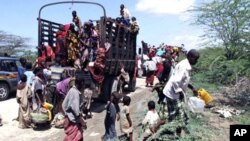The U.N. World Food Program says it is stepping up efforts to help the most vulnerable victims of drought in the Horn of Africa.
World Food Program Executive Director Josette Sheeran says the agency is increasing its delivery of food to millions of people left hungry by the severe drought in the Horn of Africa.
A statement from the director says new efforts are focusing particularly on young children and mothers.
WFP Spokesperson Stephanie Savariaud works in Nairobi. “Because of the scale of what is going on at the moment, it is very important for us to strengthen the distributions to avoid children falling into severe malnutrition," she explained. "As that is what happens if mothers and malnourished children do not get treatment urgently.”
The agency says it is currently feeding about six million people from Djibouti to Uganda and warns the number could go as high as 10 million in the months ahead.
The WFP says it is urgently seeking about $190 million in new donations to make up a budget shortfall, as its resources are stretched by the growing number of refugees leaving Somalia for camps in Kenya and Ethiopia.
Savariaud says recent donations from the United States and Brazil are helping to mobilize efforts in Somalia. “We have some donations coming," she said. "We just need more because we are in an emergency situation.”
The crisis is especially severe in Somalia, where the United Nations estimates up to one-third of the population is in need of a urgent humanitarian assistance.
Until recently, the militant Islamist group al-Shabab, which controls large swaths of Somalia, had banned Western aid organizations. Now aid groups are waiting to see what conditions the group will put on assistance.
But one group, the Saudi-based Organization of Islamic Cooperation, says it has been operating freely in Somalia since March of this year.
OIC Humanitarian Affairs Director Faud al-Maznee says the group's Islamic affiliation makes it more widely accepted in the country. “We really have no problem with access, we are everywhere, and we can compliment the international humanitarian activities. We are in the Somaliland, we are in Puntland, and we are also in the central part where the WFP cannot get access,” he said.
The OIC says it will continue to work with international partners to deliver aid. The group also recently opened a new food distribution center in Mogadishu to help those who have fled nearby villages.
WFP Increases Aid in East Africa as Resources Stretched Thin




